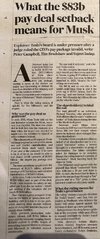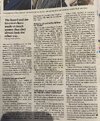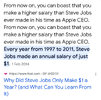- Joined
- 26 March 2014
- Posts
- 20,012
- Reactions
- 12,545
Will the Musk empire hold together?
Some think cracks are starting to show.

 www.abc.net.au
www.abc.net.au
Some think cracks are starting to show.
Elon Musk's 'train wreck' performance rattles the faithful
Elon Musk has always been a trailblazer but his erratic business antics and Tesla's shrinking margins appear to show the wheels are falling off the well-hyped machine, writes Ian Verrender.

 the left dropped their golden boy when he didn’t share their views on covid and politics
the left dropped their golden boy when he didn’t share their views on covid and politics 



